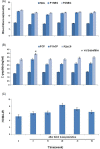Therapeutic potential of stem cells from human exfoliated deciduous teeth infusion into patients with type 2 diabetes depends on basal lipid levels and islet function
- PMID: 33660433
- PMCID: PMC8235136
- DOI: 10.1002/sctm.20-0303
Therapeutic potential of stem cells from human exfoliated deciduous teeth infusion into patients with type 2 diabetes depends on basal lipid levels and islet function
Abstract
Mesenchymal stem cells (MSCs) hold great potential in treating patients with diabetes, but the therapeutic effects are not always achieved. Particularly, the clinical factors regulating MSC therapy in this setting are largely unknown. In this study, 24 patients with type 2 diabetes mellitus (T2DM) treated with insulin were selected to receive three intravenous infusions of stem cells from human exfoliated deciduous teeth (SHED) over the course of 6 weeks and were followed up for 12 months. We observed a significant reduction of glycosylated serum albumin level (P < .05) and glycosylated hemoglobin level (P < .05) after SHED transplantation. The total effective rate was 86.36% and 68.18%, respectively, at the end of treatment and follow-up periods. Three patients ceased insulin injections after SHED transplantation. A steamed bread meal test showed that the serum levels of postprandial C-peptide at 2 hours were significantly higher than those at the baseline (P < .05). Further analysis showed that patients with a high level of blood cholesterol and a low baseline level of C-peptide had poor response to SHED transplantation. Some patients experienced a transient fever (11.11%), fatigue (4.17%), or rash (1.39%) after SHED transplantation, which were easily resolved. In summary, SHED infusion is a safe and effective therapy to improve glucose metabolism and islet function in patients with T2DM. Blood lipid levels and baseline islet function may serve as key factors contributing to the therapeutic outcome of MSC transplantation in patients with T2DM.
Keywords: diabetes; glucose metabolism; islet function; mesenchymal stem cells; stem cells from human exfoliated deciduous teeth.
© 2021 The Authors. STEM CELLS TRANSLATIONAL MEDICINE published by Wiley Periodicals LLC on behalf of AlphaMed Press.
Conflict of interest statement
The authors declared no potential conflicts of interest.
Figures






Similar articles
-
Effects and mechanism of stem cells from human exfoliated deciduous teeth combined with hyperbaric oxygen therapy in type 2 diabetic rats.Clinics (Sao Paulo). 2020 Jun 3;75:e1656. doi: 10.6061/clinics/2020/e1656. eCollection 2020. Clinics (Sao Paulo). 2020. PMID: 32520222 Free PMC article.
-
Multiple intravenous infusions of bone marrow mesenchymal stem cells reverse hyperglycemia in experimental type 2 diabetes rats.Biochem Biophys Res Commun. 2013 Jul 5;436(3):418-23. doi: 10.1016/j.bbrc.2013.05.117. Epub 2013 Jun 11. Biochem Biophys Res Commun. 2013. PMID: 23770360
-
Stem cells from human exfoliated deciduous teeth ameliorate type II diabetic mellitus in Goto-Kakizaki rats.Diabetol Metab Syndr. 2019 Feb 28;11:22. doi: 10.1186/s13098-019-0417-y. eCollection 2019. Diabetol Metab Syndr. 2019. PMID: 30858895 Free PMC article.
-
Diverse Approaches toward Application of Dental Pulp Stem Cells from Human Permanent and Deciduous Teeth in the Treatment of Diabetes.Curr Diabetes Rev. 2024;20(1):e210323214822. doi: 10.2174/1573399819666230321120734. Curr Diabetes Rev. 2024. PMID: 36959149 Review.
-
Stem Cells from Human Exfoliated Deciduous Teeth: A Growing Literature.Cells Tissues Organs. 2016;202(5-6):269-280. doi: 10.1159/000447055. Epub 2016 Aug 20. Cells Tissues Organs. 2016. PMID: 27544531 Review.
Cited by
-
Autologous and allogeneic mesenchymal stem cell-based therapies for diabetes mellitus: A systematic review and meta-analysis.World J Stem Cells. 2025 Jul 26;17(7):108202. doi: 10.4252/wjsc.v17.i7.108202. World J Stem Cells. 2025. PMID: 40740540 Free PMC article.
-
Stem Cells from Human Exfoliated Deciduous Teeth Attenuate Atopic Dermatitis Symptoms in Mice through Modulating Immune Balance and Skin Barrier Function.Mediators Inflamm. 2022 Jul 21;2022:6206883. doi: 10.1155/2022/6206883. eCollection 2022. Mediators Inflamm. 2022. PMID: 35909660 Free PMC article.
-
Bone resorption improvement by conditioned medium of stem cells from human exfoliated deciduous teeth in ovariectomized mice.Exp Ther Med. 2022 Apr;23(4):299. doi: 10.3892/etm.2022.11228. Epub 2022 Feb 21. Exp Ther Med. 2022. PMID: 35340871 Free PMC article.
-
Immunomodulatory properties of mesenchymal stem cells/dental stem cells and their therapeutic applications.Cell Mol Immunol. 2023 Jun;20(6):558-569. doi: 10.1038/s41423-023-00998-y. Epub 2023 Mar 27. Cell Mol Immunol. 2023. PMID: 36973490 Free PMC article. Review.
-
Anti-inflammatory effect of dental pulp stem cells.Front Immunol. 2023 Nov 23;14:1284868. doi: 10.3389/fimmu.2023.1284868. eCollection 2023. Front Immunol. 2023. PMID: 38077342 Free PMC article. Review.
References
-
- Cho NH, Shaw JE, Karuranga S, et al. IDF diabetes atlas: global estimates of diabetes prevalence for 2017 and projections for 2045. Diabetes Res Clin Pract. 2018;138:271‐281. - PubMed
-
- Ingelfinger JR, Jarcho JA, Ingelfinger JR, et al. Increase in the incidence of diabetes and its implications. N Engl J Med. 2017;376:1473‐1474. - PubMed
-
- Li L, Krznar P, Erban A, et al. Metabolomics identifies a biomarker revealing in vivo loss of functional β cell mass before diabetes onset. Diabetes. 2019;68:2272‐2286. - PubMed
Publication types
MeSH terms
Substances
LinkOut - more resources
Full Text Sources
Other Literature Sources
Medical

